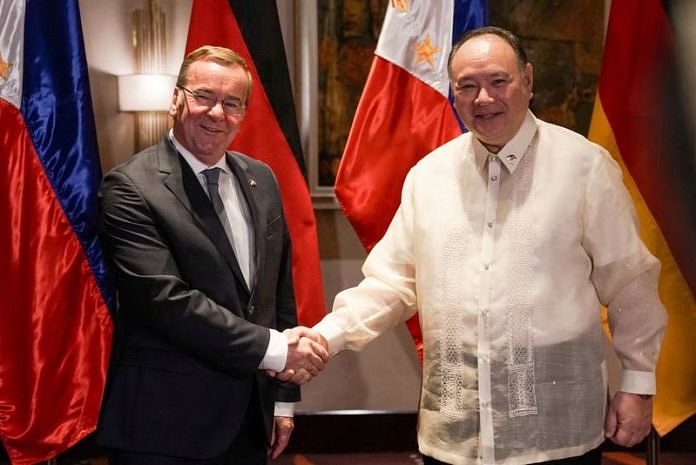On Sunday, the Philippines and Germany announced their commitment to sign a defense cooperation arrangement this year. This move is amid the increasing tensions over disputed areas in the South China Sea. The agreement aims to uphold international rules and strengthen their military ties.
Tensions in the South China Sea
Recently, the Philippines and China clashed over the South China Sea. The two countries have exchanged accusations. China has been accused of ramming Philippine navy boats, injuring a Filipino sailor. China, however, claims its actions were lawful and professional.
The South China Sea is a significant and contested area. China asserts control over most of it, including regions claimed by Vietnam, the Philippines, Malaysia, Brunei, and Indonesia. In 2016, an international court ruled against China’s claims. Beijing rejects this ruling.
Germany’s First Defense Minister Visit
German Defense Minister Boris Pistorius visited the Philippines for the first time. His visit marked 70 years of diplomatic relations between Germany and the Philippines. During the visit, he and Philippine Defense Secretary Gilberto Teodoro discussed strengthening military relations.
Both countries agreed to expand training and bilateral exchanges. They will explore new opportunities for armaments cooperation and joint projects. This partnership aims to build long-term defense ties.
Strengthening Maritime Security
Pistorius stressed that maintaining maritime borders is crucial. He said there can be no exceptions to this rule. This shows how committed Germany is to keeping sea security and following international rules.
Teodoro talked about how the Philippines needs to update its military. He mentioned that the country wants Germany’s help with advanced equipment. This includes systems for control, preventing aerial attacks, and technology for both sea and air.
Growing Concerns
China has expressed concern about the increasing ties between NATO members and Asian nations. It is wary of expanding alliances, including those involving the Philippines. The U.S. and its allies are strengthening partnerships in the Indo-Pacific region.
Recently, Germany joined the U.S.-led United Nations Command in South Korea. This group helps monitor the border with North Korea and pledges to defend South Korea in case of war. Germany’s involvement reflects its belief that European and Indo-Pacific security are interconnected.
Germany’s Focus on Rules-Based Order
Pistorius said that Germany’s actions aren’t aimed at hurting any country. Instead, they want to keep things fair and follow the rules. This means making sure that ships can travel freely and that important trade routes are safe. The South China Sea is a key trade route where over $3 trillion worth of goods move every year.
Philippines’ Stance on Conflict
The Philippines has reiterated its stance that it does not seek conflict with China. Teodoro emphasized that the conflict arises from China’s claims over the South China Sea. Manila reached a provisional agreement with China last month for resupply missions in the area. This deal aims to ease tensions and manage differences, though details remain confidential.
Way Forward
The defense cooperation between the Philippines and Germany marks an important step in addressing regional security concerns. As both nations work together to enhance their military capabilities and maintain international order, their partnership could play a key role in stabilising the South China Sea region.

